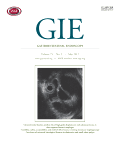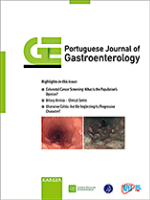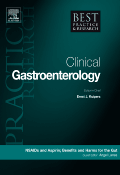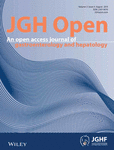
GASTROINTESTINAL ENDOSCOPY
Scope & Guideline
Transforming Knowledge into Clinical Practice
Introduction
Aims and Scopes
- Endoscopic Techniques and Innovations:
The journal consistently publishes research on novel endoscopic techniques, including but not limited to endoscopic submucosal dissection (ESD), peroral endoscopic myotomy (POEM), and various endoscopic resection methods. These studies often evaluate the efficacy, safety, and patient outcomes associated with these innovative procedures. - Artificial Intelligence in Endoscopy:
There is a notable emphasis on the integration of artificial intelligence (AI) in endoscopy, with papers exploring AI's role in improving diagnostic accuracy, enhancing adenoma detection rates, and assisting in real-time decision-making during procedures. - Management of Gastrointestinal Conditions:
The journal covers a wide range of gastrointestinal conditions treated with endoscopic interventions, including esophageal disorders, colorectal neoplasms, and pancreatic diseases. It focuses on both therapeutic and diagnostic aspects, providing insights into the best practices for managing these conditions. - Quality Improvement and Training:
Research on quality improvement measures in endoscopy practice, including training programs for endoscopists and assessment of endoscopy quality metrics, is frequently featured. This includes studies on bowel preparation quality and adherence to guidelines. - Patient Safety and Outcomes:
The journal addresses patient safety issues related to endoscopic procedures, including complications from interventions, risk factors for adverse events, and strategies for optimizing patient outcomes.
Trending and Emerging
- Integration of AI in Clinical Practice:
The integration of AI into endoscopic procedures is a rapidly emerging theme, with numerous studies exploring its role in enhancing diagnostic capabilities and procedural efficiencies. This trend reflects the growing importance of technology in improving patient care. - Focus on Patient-Centric Outcomes:
Recent publications increasingly emphasize patient-centered outcomes, including quality of life, satisfaction with procedures, and long-term health impacts. This shift highlights a broader understanding of healthcare that values patient experience alongside clinical efficacy. - Sustainability in Endoscopy:
Emerging research on the environmental impact of endoscopic procedures and the development of sustainable practices within the field is gaining traction. This includes studies assessing the carbon footprint of endoscopic practices and strategies to minimize waste. - Advanced Therapeutic Techniques:
There is a growing trend toward research on advanced therapeutic techniques, such as endoscopic ultrasound-guided interventions and novel ablation technologies. These studies indicate a shift in focus towards more innovative and effective treatment options. - Diversity and Inclusion in Research:
Emerging themes include the exploration of diversity in clinical trials and the impact of socioeconomic factors on access to endoscopic procedures. This trend reflects a growing awareness of health disparities and the need for inclusive research practices.
Declining or Waning
- Traditional Diagnostic Methods:
There is a noticeable decrease in studies focusing solely on traditional diagnostic methods without the incorporation of advanced imaging or AI technologies. The shift towards more sophisticated diagnostic tools has overshadowed conventional approaches. - Invasive Surgical Techniques:
As endoscopic techniques advance, there is a reduced emphasis on reports of invasive surgical methods when endoscopic alternatives are available. This reflects a broader trend in favor of less invasive procedures. - Long-term Follow-up Studies:
There has been a decline in the number of publications dedicated exclusively to long-term follow-up studies of patients post-endoscopy, as the emphasis moves towards immediate outcomes and procedural effectiveness.
Similar Journals

International Journal of Gastrointestinal Intervention
Unlocking Innovations in Gastroenterology and BeyondInternational Journal of Gastrointestinal Intervention is a distinguished open-access journal published by the SOC GASTROINTESTINAL INTERVENTION that has been committed to disseminating critical research since its inception in 2012. Based in the Netherlands, this journal focuses on the dynamic fields of gastroenterology, hepatology, oncology, and radiology, offering a platform for innovative studies and clinical interventions that can significantly impact patient care and medical practice. With its incorporation into Scopus and ranked within the lower quartiles in various categories as of 2023, the journal acknowledges the evolving landscape of medical research and seeks to continually elevate its contributions to knowledge in these specialized areas. By embracing open access since its founding, the journal ensures that cutting-edge research findings are accessible to a global audience, fostering collaboration and knowledge sharing among researchers, professionals, and students. The journal aims to be a premier source of information and a catalyst for advancements in gastrointestinal interventions, making it an essential resource for those dedicated to improving health outcomes in these critical medical fields.

Therapeutic Advances in Gastrointestinal Endoscopy
Unlocking New Possibilities in Gastrointestinal MedicineTherapeutic Advances in Gastrointestinal Endoscopy, published by SAGE Publications Ltd in the United Kingdom, is a cutting-edge Open Access journal dedicated to the field of gastroenterology and advancing the practice of endoscopy through rigorous research and clinical innovation. Since its establishment in 2019, the journal has become an invaluable resource for researchers, clinicians, and students, providing a platform for the dissemination of high-quality studies and novel therapeutic techniques. With an impressive Q2 ranking in the Gastroenterology category and a current Scopus rank of #63/167, it reflects the journal's commitment to fostering academic excellence and impactful research. The journal aims to enrich the field by sharing significant findings that improve patient outcomes and advance the knowledge of gastrointestinal procedures. The adoption of an Open Access model ensures that research is accessible to a global audience, thereby facilitating knowledge exchange and collaboration within the gastroenterology community.

ACTA GASTRO-ENTEROLOGICA BELGICA
Unveiling New Frontiers in Gastrointestinal HealthACTA GASTRO-ENTEROLOGICA BELGICA is a prestigious journal dedicated to advancing the field of gastroenterology through the dissemination of high-quality research and clinical insights. Published by UNIVERSITE CATHOLIQUE DE LOUVAIN (UCL), this journal is an essential resource for researchers, healthcare professionals, and students alike, focusing on a wide range of topics including gastrointestinal diseases, treatments, and innovations in clinical practices. While the journal operates under a traditional access model, its impact in the academic community is significant, ensuring that vital research is communicated effectively to stakeholders in Belgium and beyond. With its commitment to academic excellence, ACTA GASTRO-ENTEROLOGICA BELGICA plays a crucial role in fostering high-level discourse and collaboration among experts in the field, ultimately encouraging advancements that improve patient care and outcomes.

GE Portuguese Journal of Gastroenterology
Pioneering Open Access Research in GastroenterologyThe GE Portuguese Journal of Gastroenterology, published by KARGER, is a prominent platform in the field of gastroenterology, providing a vital forum for the dissemination of high-quality research since its establishment. With an open access model implemented in 2012, the journal ensures that emerging findings in gastrointestinal health are readily accessible to a global audience, facilitating the exchange of critical knowledge among researchers, practitioners, and students alike. Based in Switzerland, this journal has earned a respected position within the academic community, currently holding a Q3 ranking in the gastroenterology category for 2023, alongside a Scopus rank of #113 out of 167 in its field. Spanning converged years from 2014 to 2024, the GE Portuguese Journal of Gastroenterology aims to bridge gaps in research and practice, fostering collaboration and innovation across diverse areas within the discipline. Authors and readers alike benefit from the journal's commitment to advancing knowledge and practice in gastroenterology.

Clinical and Experimental Gastroenterology
Advancing gastrointestinal health through innovative research.Clinical and Experimental Gastroenterology is a prestigious Open Access journal published by DOVE MEDICAL PRESS LTD, dedicated to advancing the field of gastroenterology through rigorous research and innovative insights. With its ISSN 1178-7023, the journal has established a significant presence since its inception in 2008 and has been actively contributing to the academic landscape from New Zealand. The journal has attained a commendable Q2 rank in the Gastroenterology category as of 2023, placing it in the upper-tier percentile of similar journals. It currently ranks #57 out of 167 in the Scopus database, highlighting its relevance and impact in the field at the 66th percentile. Encompassing a wide range of topics within gastroenterology, the journal aims to foster discussion and disseminate findings that enhance clinical practices and patient care. Researchers, healthcare professionals, and students alike will find this journal an invaluable resource for cutting-edge research and developments in gastrointestinal health.

Gastroenterology
Connecting Research to Practice in GastroenterologyGastroenterology, published by W B Saunders Co-Elsevier Inc, is a premier journal dedicated to advancing the knowledge and practice within the fields of gastroenterology and hepatology. Established in 1945 and covering a wide range of topics related to digestive health, this journal holds a distinguished position in the academic community, as evidenced by its impressive Q1 status in both Gastroenterology and Hepatology categories, and its high rankings (4th in both disciplines) in Scopus, placing it in the top percentile for scholarly impact. With its commitment to publishing high-quality research, reviews, and clinical studies, Gastroenterology provides an essential resource for researchers, healthcare professionals, and students seeking cutting-edge insights that inform clinical practices and enhance patient care. Although it does not currently offer open access, the journal continues to serve as a vital platform for disseminating meaningful research that shapes the future of digestive disease management.

Best Practice & Research Clinical Gastroenterology
Transforming Patient Care with Cutting-Edge Gastroenterology ResearchBest Practice & Research Clinical Gastroenterology is a leading journal in the field of gastroenterology, published by Elsevier Science Ltd, that aims to disseminate high-quality research and evidence-based guidelines for clinical practice. With an impressive impact factor and ranked in the top tier (Q1) of gastroenterology journals as per Scopus, it is recognized for its critical role in advancing knowledge and best practices in clinical settings. The journal is published biannually with content that spans a wide array of topics affecting the gastrointestinal tract, and it encourages contributions from researchers and professionals who seek to enhance their understanding and improve patient care. It's accessible in both subscription and open access formats, allowing for a broad audience engagement and dissemination of pivotal research findings. Since its inception in 1999, Best Practice & Research Clinical Gastroenterology has served as a vital resource for clinicians and academics alike, contributing significantly to improvements in gastroenterological health.

JGH Open
Transforming Discovery into Practice in GastroenterologyJGH Open is a prominent open-access journal dedicated to advancing knowledge in the fields of Gastroenterology and Hepatology, published by WILEY. Since its inception in 2017, the journal has served as a crucial platform for researchers, professionals, and students to disseminate innovative research findings and clinical insights. With an impact factor and Scopus rankings reflecting its steady growth—ranking in the 3rd quartile for both Gastroenterology (Q3) and Hepatology (Q3)—JGH Open is positioned within the competitive landscape of medicine. Its commitment to open access enhances the visibility and accessibility of high-quality research, ensuring that significant advancements in understanding diseases of the gastrointestinal tract and liver reach a broad audience. With a focus on collaboration and dissemination of knowledge, JGH Open aims to contribute to the global discourse and improve outcomes in gastrointestinal health.

Clinical Gastroenterology and Hepatology
Bridging Science and Practice in Digestive HealthClinical Gastroenterology and Hepatology, published by Elsevier Science Inc, stands as a leading journal in the fields of gastroenterology and hepatology. With an ISSN of 1542-3565 and an E-ISSN of 1542-7714, this esteemed publication has earned its place in the top quartile (Q1) of both gastroenterology and hepatology categories as of 2023, ranking 6th out of 167 and 7th out of 82 respectively. The journal aims to disseminate innovative research, clinical studies, and case reports that advance the understanding and treatment of gastrointestinal and liver diseases. Targeted towards researchers, healthcare professionals, and students, it provides crucial insights into emerging therapies and medical advancements. Clinical Gastroenterology and Hepatology is not only a pivotal resource for contemporary gastroenterological research but also fosters collaboration and knowledge-sharing within the medical community. With a converging publication history from 2003 to the present, the journal continues to build on its solid foundation of scientific excellence and relevance.

World Journal of Gastrointestinal Endoscopy
Exploring New Horizons in Gastroenterology ResearchWorld Journal of Gastrointestinal Endoscopy, an esteemed publication under the BAISHIDENG PUBLISHING GROUP INC, plays a pivotal role in advancing the field of gastroenterology through its dedicated focus on cutting-edge research and innovative practices in gastrointestinal endoscopy. With a commitment to facilitating the dissemination of knowledge, this journal seeks to provide a platform for researchers, clinicians, and academic professionals to share their findings and insights into the latest endoscopic techniques, technologies, and applications. The journal aims to foster collaboration and improve patient outcomes through rigorous peer-reviewed articles that encompass a broad range of topics within gastrointestinal endoscopy. With its impact on shaping clinical practices and influencing future research directions, the World Journal of Gastrointestinal Endoscopy is an essential resource for anyone in the field, remaining accessible through various academic channels, including institutional libraries and individual subscriptions.